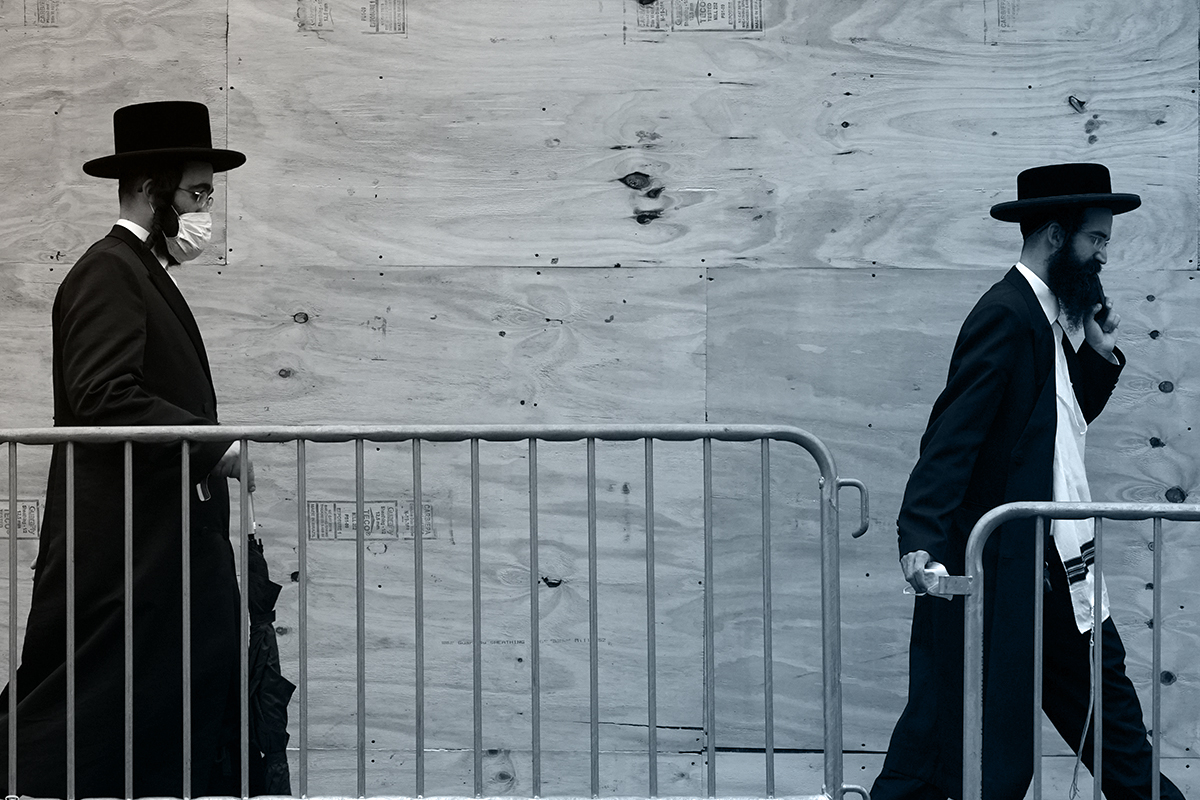As a Modern Orthodox New Yorker right now, I am terrified. This week, as I was walking to my apartment in the East Village, I heard a conversation going on behind me. “My neighborhood is going to shut down because of the dirty Jews that live there.” The woman’s voice was filled with hatred — and in that moment, I could feel the full ramifications of the upticks in coronavirus positivity rates in certain neighborhoods of New York.
On the second day of Sukkot, New York City Mayor Bill de Blasio made an announcement that the city planned to shut down nine neighborhoods with large Orthodox populations in Brooklyn and Queens. The shutdowns closed down non-essential businesses, shuls, and yeshivas. These communities had seen positivity rates skyrocket from below 1% to almost 6% in some communities. Many of these neighborhoods are home to robust Hasidic populations, with certain members of the community urging them to take it more seriously— and others inciting rule-breaking — for months.
I am a proud Modern Orthodox Jew, a proud New Yorker, and a master’s in public health student. I care deeply about the health of New York City and my own community’s safety. It is a fact that throughout the High Holiday season especially, Hasidic communities in Brooklyn and Queens have been ignoring masking and social distance guidelines, with large groups gathering for in-person services and holiday celebrations. But there is so much more nuance to these issues, and oversimplifying it puts all Jews in danger.
There is a concept in public health called culturally competent public health education. This concept takes into account the cultural, social, and religious beliefs of any community while attempting to create public information campaigns that serve them. The New York City Department of Health and Mental Hygiene (NYCDOHMH) failed to adequately consider and engage in public health education that would address the specific needs of a deeply religious and insular community.
For example, throughout the pandemic, New York City has largely relied on its test and trace programs which ensures that every New Yorker has access to free testing, competent contract tracing, and support as they navigate the COVID-19 pandemic. The entire test and trace corps has at most five Yiddish speakers. Brooklyn and Queens have almost 200,000 people who identify Yiddish as their primary language. And then, when the Department of Health finally started disseminating information in languages other than English in these communities, they were publishing information in Yiddish in some neighborhoods where Hebrew or Russian is the primary language.
Another issue? Right now, Hasidic communities do not trust local officials. Their neighborhoods have seen a massive uptake in antisemitism while government officials have done little to address these issues — at times scapegoating the Jewish community, which only makes the situation worse. In late April, Mayor de Blasio tweeted, “My message to the Jewish community, and all communities, is this simple: the time for warnings has passed.” Many took him to task for grouping all Jews together and stoking antisemitic sentiments.
Let me be clear: None of what I have mentioned above are excuses to not hold the community accountable. The people flouting social distancing guidelines are acting against the Torah. Jews are supposed to be a light among the nations. As more restrictions have come in, members of the Hasidic community of Borough Park, Brooklyn have taken to the streets in riots that have turned extremely ugly and violent. These riots are a chillul Hashem (transgression against God) and fill me with shame and rage.
All of that can be true — and we can also recognize that our public health officials and the Mayor’s department have failed these communities. And the results of this failure are going to result in more antisemitism directed towards visible Jews.
I was sitting in Washington Square Park last week watching the masked Chabadniks walk around, asking people if they were interested in shaking the lulav for the holiday of Sukkot. I feared deeply for their safety. I fear deeply for my own safety walking around New York with my Jewish friends who wear kippahs. I fear deeply that Jews are once again being blamed for a deadly disease.
I have lived in New York for two years now and I have watched the city become more hostile towards Orthodox Jews. I have been walking down the street and been spit on by strangers. Someone saw my Jewish star and called me a “dirty kike.” People will intentionally bump into or shove my male Jewish friends who are marked by their kippahs. A week ago, a male friend of mine asked me if he should stop wearing his kippah around New York City. Two years ago, I would have said no, absolutely not, but this time, I hesitated and I told him maybe. I know that these neighborhoods shut downs will only make antisemitic attacks worse.
In my particular Orthodox community, everyone wears masks. Throughout the High Holidays, we had RSVP-only outdoor services where masking was required. We deeply value both pikuach nefesh (to preserve a life) and Jewish observance. Which is all to say: The Orthodox community isn’t a monolith. There are people in Hasidic communities in Brooklyn who have been leading the fight for public health awareness in their community, and have faced violent consequences. There are Orthodox communities throughout the city who have prioritized public health through the holiest time of year.
Placing the blame for rising rates on an already vulnerable population won’t prevent a second wave, but I fear it will ensure more Jews die. We have a long time before we see the end of this pandemic. I hope the mayor and other New York City leaders see that generalizing Orthodox Jews puts my community in harm’s way.
Header image: Orthodox Jewish men walk through a Brooklyn neighborhood on September 29, 2020 in New York. Photo by TIMOTHY A. CLARY/AFP via Getty Images.



